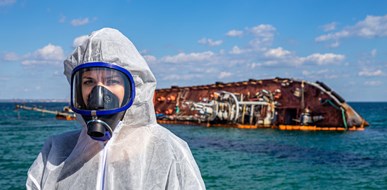[New publication] Ecocide: the environment as victim at the International Criminal Court
Published 21 March 2023
@Shutterstock - The Rome Statute of the International Criminal Court (ICC) allows for the recognition of nonhumans as victims of ecocide, writes Giovanna Frisso.
The existing legal framework of the Rome Statute of the International Criminal Court (ICC) allows for the recognition of nonhumans as victims of ecocide, argues Giovanna Frisso (University of Lincoln) in the new ICD Brief ‘Ecocide: the environment as victim at the International Criminal Court’.
“Ecocide” has been defined as unlawful or wanton acts committed with knowledge that there is a substantial likelihood of severe and either widespread or long-term damage to the environment being caused by those acts. This definition of ecocide, as proposed by the Independent Expert Panel convened by the Stop Ecocide Foundation in 2021, aims to protect the environment as an end in itself. The definition was presented as a starting point for the consideration of an amendment to the founding treaty of the ICC, and with the aim of adding ecocide as the fifth international core crime (besides genocide, war crimes, crimes against humanity, torture and crimes of aggression).
Nonhumans as environmental victims
In the new ICD Brief ‘Ecocide: the environment as victim at the International Court, author Giovanna Frisso (University of Lincoln) focuses on the potential recognition of nonhumans as environmental victims by the ICC. One of the most innovative provisions of the Rome Statute concerns victims’ rights to participate in the proceedings and to have the harm suffered repaired.
In the brief, Frisso describes the different meanings associated with the term ‘victim’ in the ICC, including the different interpretations of the criteria provided for by the definition of the term under Rule 85(a) of the ICC Rules of Procedure and Evidence. Within the ICC, the recognition of the status of victims opens up opportunities for the concerns of nature to be asserted by a legal representative and for reparations to be sought on behalf of ecosystems. The author concludes that the existing legal framework allows for the recognition of nonhumans as victims of ecocide.
Read the full ICD brief.
About the author
Giovanna Frisso is a senior lecturer at the Lincoln Law School, University of Lincoln (United Kingdom). She holds a PhD degree on victims’ rights at the ICC from the University of Nottingham (UK). She was a visiting professional at the Victims Participation and Reparation Section at the ICC and volunteered to work as a legal assistant at the Tribunal Internacional de Justicia Restaurativa en El Salvador.
About the International Crimes Database
The International Crimes Database, hosted and maintained by the T.M.C. Asser Instituut, offers a comprehensive database on international crimes adjudicated by national, as well as international and internationalised courts.
